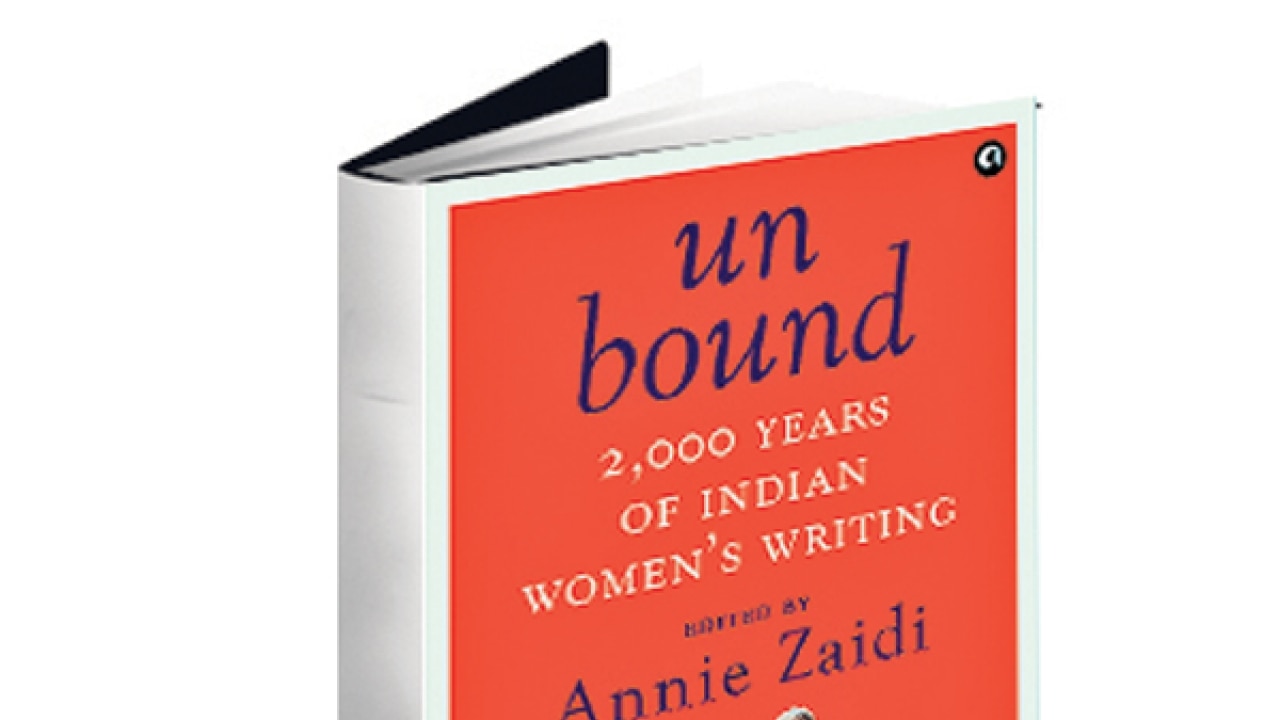
Book Review: Unbound- 2,000 years of Indian Women’s Writing
Author: Annie Zaidi
Publisher: Aleph
Pages: 357
Rs: 595
Unbound: 2,000 Years of Indian Women's Writing is an omnibus anthology, many anthologies rolled into a slim, single 375-page volume with more than 100 authors from a dozen or so languages from around 4th century Before Common Era (BCE) to present day. It is an audacious project, but editor Annie Zaidi has carried it deftly and even with a touch of lightness. She has gone about the job with a certain nimbleness, avoiding the pitfalls of a coarse feminist framework and, at the same time, trying to showcase the work of women writers and poets, and through them what can be called feminine sensibility -- a phrase Zaidi does not use. She prefers "gender and literary longevity".
She writes, "Apart from craft, I looked for novelty, empathy, a fresh perspective, great historical significance, insights into gender and literary longevity." It does not make her immune to further questioning but she has made it clear that it is a matter of personal taste. And her taste is quite good, which is reflected in some of the sections into which she has divided the collection, especially Spiritual Love, Secular Love, Marriage and Children. The other sections include Food, Work and Identity (which is not confined to gender identity).
The poems included in Spiritual Love are fascinating for their poetic and existential depth. Though written by women with the writings referring to spiritual experience as experienced by women, the intent and tone of the women poets and saints soar far above that of being a woman.
And yes, they are well-crafted, one of Zaidi's criteria for inclusion in the anthology. You have Zeb-un-Nisa, daughter of Aurangzeb and composer of Persian verse with a mystical tilt, who says, "Why should we but in the assembly pray/Only when friends are gathered call for wine/Lo, I have done with this hypocrisy/And ever pray and drink the cup divine." On the other hand, Rajai, a 13th century Marathi poet and wife of mystic Namdev, articulates the feelings of a needy woman who is not ignorant of or indifferent to religious joy and addresses divinity, "I have a family, hungry mouths to feed/Namdev, my Lord, pays no heed."
This is followed by the section on Secular Love, which has its surprises. There is the 18th century Telugu poet from Thanjavur, Muddupalani, whose Radhika Santawanam is an erotic description of a lovelorn and distraught Radhika from the male lover's point of view. Contrast this with Odiya writer Yashodhara Mishra's A Matter of Choice, where in the typical modernist/feminist self-conscious manner the erotic experience becomes an etching of ennui: "There wasn't either happiness or gloom in there. The experience was like that of a wall that had crumbled that had stood needlessly as an obstacle all the while..."
It would appear that the women writers of the pre-modern era, whether the Buddhist nuns of the Theirgatha, the Tamil poets of the Sangam period or the women-saint-poets of the Bhakti era, from ninth-century Andal in Tamil country to 13th century Marathi women-poets like Rajai, did not really shed their womanhood in their poetic-mystic experience but lived it without any self-consciousness.
There are enough moments of irony and intensity in the self-conscious mode as well when it is handled by an imaginative writer. This can be seen in Malayalam writer Rajalakshmi's short-story, The Apology and the confessedly Telugu feminist writer, Volga, in the story The Experiment. Rema, the lecturer, comes upon a shocking turn in the classroom when she sets out to teach Lytton Strachey's essay. She writes: "She'd been to the class how akin Strachey's thought was to Vedanta." In Volga's story, it is the woman who looks down with cold compassion on a man going through the throes of divorce.
It would be inaccurate to think of women's writings being women-centric in the narcissistic sense. Atia Hosain, Rashid Jahan and Nirupama Borgohain describe the moment in national life when women were caught up in the broader stream of freedom struggle. In Hosain's story, there is the innocent emancipation from the cousins evading the marriage bond. Jahan shows how women fight in their own way the Hindu-Muslim battle at the time of Partition. In Borgohain's story, it is the simple joy of being part of the freedom struggle.
The anthology does raise provocative questions but it manages to keep them at the margins because the writings themselves make for good reading. The polemics can wait.